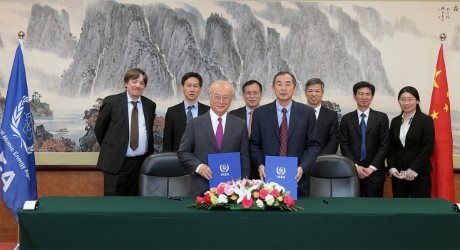Chinese transit assured for LEU Bank
12 April 2017
China has signed an agreement under which it will ensure the safe and secure transit of low-enriched uranium (LEU) and equipment through its territory to and from the International Atomic Energy Agency (IAEA) LEU Bank, which is being established in neighbouring Kazakhstan.
 |
| The agreement was signed at a ceremony in China (Image: CAEA) |
The agreement was signed on 5 April by IAEA Director General Yukiya Amano and Wang Yiren, acting chairman of the China Atomic Energy Authority (CAEA), during Amano's official visit to China.
Owned and controlled by the IAEA, the bank will host a physical reserve of up to 90 tonnes of LEU suitable to make fuel for a typical light water reactor. It will serve as a supplier of last resort for IAEA member states in the event they are unable to acquire the material from the commercial market or by any other means. The bank will be located at the Ulba Metallurgical Plant in Oskemen, Kazakhstan.
The facility is seen as an important part of international efforts to prevent nuclear proliferation, dissuading countries from building enrichment facilities that might be misused to purify uranium to weapons-grade levels by guaranteeing access to LEU for fuel use should other sources fail. Other assurance of supply mechanisms established with IAEA approval include a guaranteed physical reserve of LEU maintained by Russia at the International Uranium Enrichment Centre in Angarsk, and an assurance of supply guarantee for supplies of LEU enrichment services in the UK. The USA also operates its own LEU reserve.
The IAEA in 2015 signed a similar transit agreement with Russia, providing for the transport of LEU and equipment through Russian territory to and from the bank.
According to IAEA figures, funding for the bank has come from the European Union (€24.4 million, $26 million), Kuwait ($10 million), Norway ($5 million), the United Arab Emirates ($10 million), the USA ($49 million) and US-based organisation Nuclear Threat Initiative ($50 million). Kazakhstan has contributed funding of $400,000 plus in-kind contributions.
Researched and written
by World Nuclear News